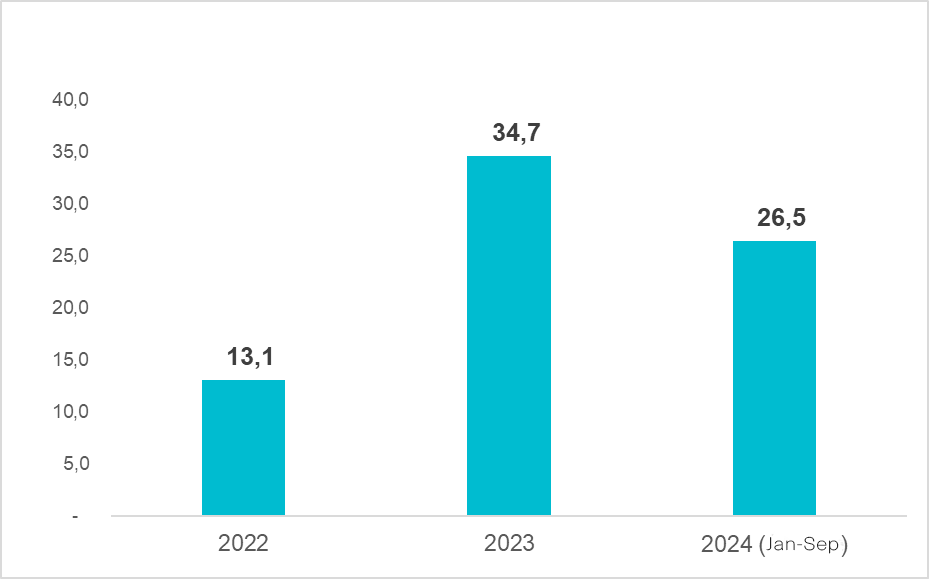For five months, the President has not signed into law the Bill 9559-d supposed by the parliament which aims to expand the powers of local self-government bodies in supporting Ukraine’s security and defense sector. However, considering the prolonged discussions (the bill was voted only nine months after its registration), the question of whether this step is appropriate remains ambiguous.
To logically conclude the idea of granting communities the legal ability to conduct defense procurements, it was necessary to introduce specific amendments to the Budget Code of Ukraine to allow this. These changes appeared in the law on restoring medium-term budget planning at the local level, which contains a clause on the possibility of procurements “for further transfer to budgetary institutions funded from other budgets,” which legalizes procurements by local councils for military units.
Background
Until the law on expanding the powers of local self-government bodies (LSGBs) comes into effect, communities de jure do not have the right to directly implement defense procurements. According to budget legislation, matters of national interest (including defense and security) are funded from the state budget, while local budgets cover local expenditures (e.g., public amenities or kindergartens) and state-delegated powers (e.g., secondary education). Additionally, the specialized Law of Ukraine “On Local Self-Government” specifies the powers of local authorities across sectors and decision-making entities (such as council sessions or executive bodies). On June 18 of this year, Parliament amended this law to allow local government bodies to directly make expenditures on defense. In September, provisions of budget legislation enabling procurement for the military from local budgets came into force.
Why is this important?
Discussions about the necessity of funding defense expenditures from all possible sources began almost immediately after the onset of the full-scale invasion. In response, the government developed a mechanism in March 2022 to enable local budgets to support the Defense Forces. By early April of the same year, the Ministry of Finance enabled the technical feasibility of transferring funds from community budgets to military units through subventions. Despite martial law, overall revenues of local budgets were executed as planned (of course, this refers to the aggregate figure, as the budgets of temporarily occupied and frontline communities suffered greatly). Several factors contributed to this, including the adjustment of plans and advance tax payments by certain taxpayers. Particularly significant were the revenues of local budgets from the “military PIT,” which, starting from the fourth quarter of 2023, was redirected by Parliament from local councils to the special fund of the state budget. For 2024 the planned transfer is nearly UAH 100 billion. This policy will remain in effect at least until the end of martial law, and it is incorporated into the Budget Declaration until 2027.
The issue of allowing local councils to finance the Armed Forces of Ukraine (AFU) became particularly pressing after scandals involving “questionable” procurements during wartime, such as the infamous “drums for shelters.” The public demanded that funds from local budgets be redirected to the Defense Forces instead of such inefficient expenditures. In response to public outrage, a draft law was introduced to the parliament in August 2023, allowing communities to directly procure specialized equipment, such as drones, for military units.
Until now, some communities have continued to support the Defense Forces through lawful means—transferring financial aid upon requests from military units. Naturally, the capabilities of different communities vary. However, in total, local councils allocated approximately UAH 35 billion to military needs in 2023, amounting to 7.3% of the local budgets’ own revenues.
“Military” expenditures of local budgets in 2022–2024, actual, billion UAH

Source: OpenBudget
Note: The chart includes expenditures under the following codes: 9800 (subvention from the local budget to the state budget for implementing socio-economic development programs for regions); 9820 (subvention from the local budget to the state budget for transferring funds during martial law or for measures related to general mobilization, repelling, and deterring armed aggression by the Russian Federation against Ukraine, ensuring national security, and eliminating threats to Ukraine’s state independence and territorial integrity), and 8240 (measures and works related to territorial defense). The data is approximate, as these funds include subsidies transferred to the state budget but not directly related to the war.
In addition, local councils directly implemented military procurements, disguising them under various classification codes. This constitutes a violation of budget legislation, as defense falls under the responsibility of the state budget. However, under public pressure and sometimes to gain political dividends, local councils engaged in such procurements, occasionally on a significant scale. According to a study by the DOZORRO Project of Transparency International Ukraine, in 2023, communities procured at least 27,000 drones worth UAH 2.6 billion through Prozorro.
What are the primary arguments pro and con?
The ability of local councils to conduct procurements relatively quickly enables the prompt supply of equipment to the military compared to financial transfers. Both sides are interested in “in-kind” supplies – military units find it more convenient to receive ready-to-use equipment rather than manage procurement themselves, which requires specialists such as procurement officers, accountants, etc. This method also allows for the provision of equipment not officially listed in military regulations for a specific unit. For local authorities, this is an opportunity to gain political points because a photo with a “pyramid” of drones is more appealing than a document about a subvention. Partly for this reason, but also out of a genuine desire to help the Defense Forces quickly, many local councils opted for such procurements. However, this may lead to accusations in the future. According to Oleksandr Slobozhan, Executive Director of the Association of Ukrainian Cities, “cases of mayors being accused of misusing funds have become widespread.” The Ministry of Finance also supports the position that direct defense procurements from local budgets are unlawful. But why were communities not allowed to procure military equipment in the first place?
Indeed, given the state budget’s limited financial resources and the Defense Forces’ significant needs, an additional source – local budgets – would undoubtedly be valuable. However, it is crucial to recognize the risks associated with this approach. The main risk is ensuring the procurement of high-quality and really necessary equipment. Only the Defense Forces are fully aware of the tasks of various military units and their corresponding needs. Even if communities are allowed to make such procurements based on unit requests and nomenclature, risks will remain. At best, there is a risk of inefficient use of funds due to fragmented purchases instead of bulk procurement. At worst, the procurement of substandard equipment, stemming from a lack of expertise in military procurement among local officials, could cost the lives of our defenders.
Representatives of local authorities often find it challenging to explain to citizens the absence of such expenditures when the local budget has limited capacity. Communities vary in their financial capabilities, having been established based on their ability to fulfill the responsibilities defined at that time. Adding a significant new task – supporting the Defense Forces – requires finding additional funds. Simultaneously, local needs, especially protected expenditures, must also be addressed. An example of such misunderstandings between local authorities and the public was the recent imbalance concerning the “military” PIT. Communities hosting registered military units received substantial additional resources, which they could allocate, for instance, to supplementary payments for locally mobilized service members. In contrast, neighboring communities without this budgetary “bonus” were struggling. Explaining the lack of funds for equally deserving military personnel from adjacent villages or towns became extremely challenging.
Why was the adopted law insufficient?
Upon presidential approval, Bill 9559-d will amend only the legislation concerning local self-government. However, amendments to the Budget Code are also necessary. Parliament is currently considering three versions of such amendments: 9560, 9560-1, and 9560-2, each proposing different approaches to modifying budget legislation.
The Association of Ukrainian Cities supports version 9560-1, as it most clearly and comprehensively grants all local budgets the authority to directly procure goods, works, and services for the benefit of military units. The other two bills contain more ambiguous language regarding the implementation of local targeted programs, which are already required when using the subvention mechanism, and therefore do not fully address the issue of “legalizing” defense procurements by local councils.
Eventually, the necessary provision appeared in “non-core” amendments to the Budget Code of Ukraine (BCU). A law adopted to fulfill commitments to international partners on restoring medium-term budget planning at the local level, in line with Ukrainian legislative tradition, contains provisions unrelated to its primary purpose, including those on local borrowing. Moreover, it includes the critical provision for defense procurements: as an exception during wartime and in order to repel the aggression, local authorities are allowed to make expenditures not attributed to their respective budgets. Funds for maintaining budgetary institutions can come from various budgets, not only through inter-budgetary transfers but also by procuring goods (works, services) for transfer to such institutions. De facto and de jure, this allows local councils to implement procurements for military units. The only remaining step is to chang the budget classification system, which will formally enable this practice.
Conclusion
The necessity of supporting Ukraine’s Defense Forces by all possible means is beyond doubt, especially given that international aid cannot yet be used for this purpose. Therefore, despite prolonged debates, Parliament ultimately approved the law expanding the powers of local councils in the defense sector. Most importantly, the required provision of budget legislation has come into force.
Any alternative decision would have been unpopular both among the public (as it would seem to deprive the army of funding) and among local councils, many of which have already been conducting direct defense procurements or planning to do so and have long awaited the “legalization” of such powers.
An important argument supporting this decision was information from the Ministry of Finance of Ukraine, provided at the request of the Association of Ukrainian Cities. According to this data, from January to July 2024, principal budget administrators utilized only 45% of the “military PIT” collected from communities. Specifically, during this period, the Ministry of Strategic Industries used only 2% – UAH 529 million – of the UAH 25 billion allocated to it.
Granting local self-government bodies the authority to conduct local defense procurements is a significant step, but it requires a comprehensive approach to risk management. The President’s signing of the respective law is necessary to fully implement this initiative; however, potential risks must be carefully considered.
Previously, a centralized approach (using transfers) allowed for the mobilization of financial resources from local budgets without losing the strategic focus of procurements. Now, it is necessary to strike a balance between the speed of procurement and alignment with the overall war strategy. Otherwise the rapid adoption of poor decisions could come at extremely high cost.
Granting procurement powers to hundreds of local councils without proper coordination may result in inefficient procurement, which can have significant negative consequences. To mitigate these risks, we advise that military units must provide clear specifications for procurements, ensuring that local councils purchase exactly what is needed for a specific unit.
Photo: depositphotos.com
Attention
The author doesn`t work for, consult to, own shares in or receive funding from any company or organization that would benefit from this article, and have no relevant affiliations



